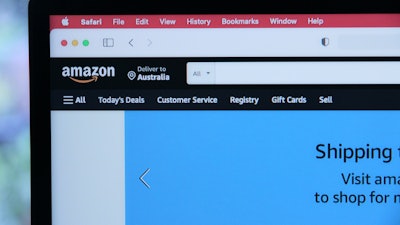
People went online to do more day-to-day activities when the world shut down in 2020 due to the global pandemic. As a result, e-commerce exploded. It’s no surprise that the pandemic also accelerated Amazon’s growth, and it is now the world’s largest retailer outside of China.
In 2020, Amazon hit a record with annual revenue up 38% to $386 billion and net profit up 84% for the year. The 2021 Amazon Annual Report stated, “Our consumer revenue grew dramatically in 2020. In 2020, Amazon’s North America and international consumer revenue grew 39% YoY on the very large 2019 revenue base of $245 billion; and, this extraordinary growth extended into 2021 with revenue increasing 43% YoY in Q1 2021. These are astounding numbers. We realized the equivalent of three years’ forecasted growth in about 15 months.”
Amazon’s ascension is amplified by its “customer obsession” and AI-driven product recommendations.
Amazon finds ways to get customers what they want when they want it — as simply and easily as possible. As customers search through Amazon’s tens of millions of products, AI models provide relevant product recommendations that lead to larger orders. Without AI, targeting shoppers with relevant product recommendations would be challenging, if not impossible.
Success Secret: Meet the Flywheel Approach
“Flywheel” is a term that originated in engineering. It’s a method of increasing momentum while conserving energy. Getting a flywheel started takes a lot of energy, but only tiny energy boosts are needed to keep the momentum going over time.
Amazon invested heavily in AI early. The more data it gathered, the better Amazon became at understanding its products and customers. Early data helped create basic insights that linked products and customers — enough to start making predictions about what else a customer might buy while they’re shopping. And over time, by observing each customer’s interactions with those product recommendations, Amazon’s AI models learned more, adapted and improved: a flywheel effect on a massive scale.
Amazon dominates markets with a three-pronged AI approach.
AI-powered product recommendations
Personalized product recommendations are powered by Amazon’s item-to-item collaborative filtering, which matches each user’s previous purchases to similar products, and then turns that into a list, ideally aligned with what the user is likely to buy. After clicking on a header such as “Recommended for you,” the list can be filtered by product type, customer reviews, etc. These suggestive selling features account for 35% of customer purchases on Amazon and translate to roughly $50 billion in sales.
Using AI to draw shoppers in, product page recommendations pique their interest with personalized suggestions such as “frequently bought together” and “featured items you may like.” These recommendations are constantly optimized to convert into sales.
Search relevancy
Amazon uses cutting-edge AI technology to understand the meaning of customer searches, the relevance of possible results and the context of searches to enhance the customer experience and gain customer loyalty. Amazon uses AI to convert three times more searches into sales than competitors – earning $800 million per month due to AI-enhanced search features.
Audience monetization
Advertisers are willing to pay to get in front of Amazon’s customers to take advantage of the vast customer data harnessed by Amazon’s AI technology. That same AI technology directing customers to buy an item on Amazon can also route the right advertisement to the correct customers. Amazon is making the sales and getting paid to make those sales, too.
In 2020, Amazon earned more than 10% of U.S. digital ad spending. Customers see sponsored ads, display ads, sponsored brand listings, video ads and DSP (demand-side platform) ads to direct them to a possible purchase.
When Amazon started using recommendations technology in 1999, Google hadn’t yet figured out how to use ads. Now, 22 years later, Amazon makes nearly half its profit from ads.
Why Distributors Are Different Than Amazon
A distributor can’t just copy Amazon with hopes of replicating its success. Instead, distributors must acknowledge their unique strengths and weaknesses before applying similar AI techniques.
Distributors should:
Consider what type of product recommendations they should be making on eCommerce. They will not be the same as a direct-to-consumer business. Examples:
- When a customer logs in, recommend re-orders or new products for them
- On a product page, recommend similar and related items
- At checkout, recommend items to complement the order being placed
Determine how they can leverage their multi-channel sales structure
- For example, data from your eCommerce site can benefit the success of an outside sales rep and vice versa. Distributors should consider what a true omnichannel AI strategy might look like; which Amazon will never be able to compete with.
What Distributors Can Learn from Amazon’s AI Approach
In the survey, “Getting Strategic Value from Data Analytics When Initial Attempts Fail” (sponsored by Sisense for the Harvard Business Review), “54% of respondents said agility and speed of sourcing is a top priority for their purchasing options.” If you can’t get your customers what they want when they want it, they’ll pivot to your competitor.
Distributors have a tremendous amount of data at their fingertips. Those that win customer attention by using AI will be the winners. When your customers get real-time product recommendations, relevant search results and are reminded of things they missed adding to the cart; they will keep coming back because the shopping experience with your company is easy and they get what they need quickly.
This is the moment for distributors to build their AI technology, activate the AI flywheel and leverage AI insights about customer preferences and buying behaviors to capture market share.
Benj Cohen is the founder and CEO of Proton.ai.






















